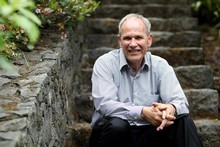The Auckland C 
The "innovation clusters" were mapped out in the Auckland Unleashed discussion document, which lays out ideas on where the council might take the city over the next three decades.
The document stressed the importance of manufacturing to the Auckland economy and claimed it contributed 38.4 per cent to the region's GDP and produced more than half of the city's exports.
innovation DAILY
Here we highlight selected innovation related articles from around the world on a daily basis. These articles related to innovation and funding for innovative companies, and best practices for innovation based economic development.
Disrupting Centralized Linear University Model
 Patent reform is on everyone’s mind. With a whole lot less fanfare, Version 1.0 of the Open Source Hardware definition was released last week by a community of volunteer hackers, business people, and other experts. Open source hardware is a new way to share design information. It gives inventors the option to eschew a patent and instead, freely publish design details, blueprints and other information about mechanical and electrical inventions (for example robots and printed circuit boards). Version 1.0 of the definition is not yet a license – defining license details will be the next step.
Patent reform is on everyone’s mind. With a whole lot less fanfare, Version 1.0 of the Open Source Hardware definition was released last week by a community of volunteer hackers, business people, and other experts. Open source hardware is a new way to share design information. It gives inventors the option to eschew a patent and instead, freely publish design details, blueprints and other information about mechanical and electrical inventions (for example robots and printed circuit boards). Version 1.0 of the definition is not yet a license – defining license details will be the next step.
Open sourcing software code and hardware designs could be viewed as the ultimate enactment of the spirit of the Bayh Dole Act, whose purpose is to get federally-funded university inventions into widespread, public use. Open source licenses are controversial. Depending on your point of view, open source hardware licenses could someday act as an “unpatent,” flooding the coffers of prior art and stifling company innovation. Or, like low cost, customizable open source software such as Linux/Apache/MySQL/PHP, freely shared hardware design information could create a bigger playing field and stimulate innovation and profitable invention.
Boston VCs Test ‘Collegial, Youthful’ Investment Style - Venture Capital Dispatch - WSJ
 Boston’s venture capitalists are stepping up efforts to get close to young entrepreneurs and to step out of the shadow of Silicon Valley.
Boston’s venture capitalists are stepping up efforts to get close to young entrepreneurs and to step out of the shadow of Silicon Valley.
Thursday night they launched a collaborative workspace called CriticalMass in a Cambridge office building near Massachusetts Institute of Technology, just down the avenue from Harvard University where Mark Zuckerberg launched Facebook. Of course, he then moved to California, which some think sort of symbolizes Boston’s problem.
Perhaps the Asian hors d’oeuvres at the launch party were meant to infuse a cool, West Coast vibe. Down the hall, draft beer flowed at the weekly Venture Café. If you stayed away from the windows – it was snowing – you could imagine yourself at a South of Market (San Francisco, that is) shindig.
Google Makes $900 Million Stalking-Horse Bid For Nortel Patents As It Looks To Fend Off Trolls
 The patent system is busted. Tech rivals are throwing lawsuits at each other to shoot down competitors instead of trying to win with innovative products. And Google’s had enough of being pushed around.
The patent system is busted. Tech rivals are throwing lawsuits at each other to shoot down competitors instead of trying to win with innovative products. And Google’s had enough of being pushed around.
Today in a blog post, Google has announced that it’s going to help fend off attacks on both itself and ecosystems of projects like Android and Chrome by bidding on the Nortel patent portfolio — a trove of 6,000 valuable patents that relate to a variety of technologies including wireless, 4G, data networking, and more. Which, should Google win them, would be a strong deterrent for any other companies thinking of suing Google or one of its partners.
Google hasn’t won anything yet — there’s still going to be an auction planned for June when other companies will be able to bid above the $900 million stalking-horse bid. Nortel is selling the patents as part of a bankruptcy auction and says that the Google bid “follows a confidential, multi-round bidding process involving several interest companies” — which reportedly included Apple, who could presumably follow up with their own bid in the main auction.
How Brain Science Can Save You From The Wrong Job
 As a child psychiatrist, I’m asked every day to help a struggling young person do better. For example, I recently saw a boy I’ll call Tommy, who was floundering in sixth grade in spite of increasingly vehement exhortations from his teachers and parents to try harder.
As a child psychiatrist, I’m asked every day to help a struggling young person do better. For example, I recently saw a boy I’ll call Tommy, who was floundering in sixth grade in spite of increasingly vehement exhortations from his teachers and parents to try harder.
I could see how downcast he was, so I immediately turned to a process I’ve developed for kids like him. It began with figuring out what he liked to do (build things and play guitar) and what he was good at (math, science, music, and hands-on projects) and urging him to do those things more often.
IDEA OF THE DAY: If You Stare At A Computer Screen All Day, These Glasses Could Save Your Eyesight
 The idea: After staring at a computer screen all day, in addition to your smartphone, Kindle and other electronic devices, your eyes start to take a beating.
The idea: After staring at a computer screen all day, in addition to your smartphone, Kindle and other electronic devices, your eyes start to take a beating.
Specialty eyewear maker Gunnar Optiks believes it can help those who spend hours peering at digital content.
Using a combination of lens materials and coatings, the San Diego company creates glasses that aim to alleviate eye strain from prolonged screen use.
Jobs Young Professionals Want
 What are the companies young professionals consider cool? Universum conducted a survey to find out.
What are the companies young professionals consider cool? Universum conducted a survey to find out.
It asked more than 10,000 college graduates with one to eight years of work experience which companies they'd most like to work for. The subjects were given a list of 150 potential employers to choose from and asked to pick up to five.
They could also write in another answer. Not surprisingly, Facebook was one of the top write-ins.
How Startups Can Use Metrics To Drive Success
 One of the things I discuss the most with the portfolio companies I’m involved with is that “you manage what you measure.”
One of the things I discuss the most with the portfolio companies I’m involved with is that “you manage what you measure.”
It’s a very important concept for me because in a startup you are constantly under pressure and have way too many distractions. Having a set of metrics that you watch & that you feel are the key drivers of your success helps keep clarity.
And the more public you can make your goals for these key metrics the better. Make them widely available inside the company and share your most important goals with your board. Transparency of goals drives performance because it creates both a commitment and a sense of urgency.
The Dead Sea Is Disappearing, but Could Be Saved: Scientific American
 The surface of the Dead Sea, already 424 meters below sea level, is falling by a meter a year. Jordanians to the east, Israelis to the west, and Syrians and Lebanese to the north are pumping so much freshwater from the Jordan River that almost none reaches the sea any more. Israel and Jordan are also siphoning water from the lake to extract valuable minerals, hastening the decline.
The surface of the Dead Sea, already 424 meters below sea level, is falling by a meter a year. Jordanians to the east, Israelis to the west, and Syrians and Lebanese to the north are pumping so much freshwater from the Jordan River that almost none reaches the sea any more. Israel and Jordan are also siphoning water from the lake to extract valuable minerals, hastening the decline.
Photojournalist Eitan Haddok has traveled from Paris to the Middle East many times to document the sea's retreat, as scientists try to understand the repercussions. Here are some additional Haddok images and insights to consider.
The "Innovation for Jobs" Chasm
 Sweden handled the latest financial crisis better than most nations. Its growth rate is among the OECD's highest, the budget deficit should become a surplus in 2011, and unemployment is declining to 5%. What does the Swedish example show us, and what lies ahead? Sweden combined fiscal prudence with labor activism. The economy would have fared even better had labor and innovation policies meshed.
Sweden handled the latest financial crisis better than most nations. Its growth rate is among the OECD's highest, the budget deficit should become a surplus in 2011, and unemployment is declining to 5%. What does the Swedish example show us, and what lies ahead? Sweden combined fiscal prudence with labor activism. The economy would have fared even better had labor and innovation policies meshed.
Politicians have started to discuss innovation as a job creator. This is logical. Innovation is the main driver of economic growth. But are countries organized to do anything about it? We think not.
Open for business - Public Service
 The contemporary industrial landscape is characterised by strong, international competition. Governments have for quite some time focused on how investments in research and development (R&D) may enable their economies to become more knowledge-based and better positioned in this global division of labour. But the link between input in the form of R&D and output in the form of value creation is not a straightforward one. The universities, higher education institutions and research institutes of individual countries can only be the best within a limited number of areas. At the same time, modern products and production processes are becoming increasingly complex, and incorporate technologies from many such domains. In our efforts to stimulate industrial creativity, we are forced to recognise that much of the technological basis for this creativity will come from foreign research communities, and materialise as new products or production processes by way of collaboration with customers and suppliers located abroad. In the words of the Organisation for Economic Co-operation and Development, we have entered an era of 'global open innovation'.
The contemporary industrial landscape is characterised by strong, international competition. Governments have for quite some time focused on how investments in research and development (R&D) may enable their economies to become more knowledge-based and better positioned in this global division of labour. But the link between input in the form of R&D and output in the form of value creation is not a straightforward one. The universities, higher education institutions and research institutes of individual countries can only be the best within a limited number of areas. At the same time, modern products and production processes are becoming increasingly complex, and incorporate technologies from many such domains. In our efforts to stimulate industrial creativity, we are forced to recognise that much of the technological basis for this creativity will come from foreign research communities, and materialise as new products or production processes by way of collaboration with customers and suppliers located abroad. In the words of the Organisation for Economic Co-operation and Development, we have entered an era of 'global open innovation'.
10 Leadership Lessons From Food Network Chefs | BNET
 Engaged in a fierce battle on last night’s Chopped All-Stars, chef Aarón Sanchez quipped, “When brilliance happens, you don’t ask where it came from, you just kind of go with it, ride the wave.”
Engaged in a fierce battle on last night’s Chopped All-Stars, chef Aarón Sanchez quipped, “When brilliance happens, you don’t ask where it came from, you just kind of go with it, ride the wave.”
It didn’t matter that he was referring to making whipped cream out of chickpeas; he might just as well have been talking about the next high-tech innovation or big business idea.
If you watch enough Food Network shows like Iron Chef or Worst Cooks in America, a picture of what greatness is all about begins to emerge. No, I’m not talking about great chefs making great food. I’m talking about great leaders.
Women of Color in Tech: How Can We Encourage Them?
 Over the last five years, I have taught more than 300 really smart students. One of the smartest, at the Masters of Engineering Management program at Duke University, was Viva Leigh Miller, a black woman. She had the ambition of moving to Silicon Valley after she graduated last year. I expected she would become a hotshot CEO.
Over the last five years, I have taught more than 300 really smart students. One of the smartest, at the Masters of Engineering Management program at Duke University, was Viva Leigh Miller, a black woman. She had the ambition of moving to Silicon Valley after she graduated last year. I expected she would become a hotshot CEO.
But Viva couldn’t get a job in the Valley—despite introductions that I gave her to leading venture capitalists. I have never understood why. During my tech days, I would have hired Viva in a heartbeat. She had the determination, drive, and education that all tech companies look for.
It raised a red flag in my mind.
Young Entrepreneur Donates $1M to College Start-up Incubator - AOL Small Business
 The University of Waterloo, located in Ontario, Canada, announced Tuesday that it received a $1 million donation from 23-year-old alum and tech entrepreneur Ted Livingston. The money was given to help fund VeloCity, the University's residence-based program for student entrepreneurs. Livingston, who is the founder of mobile messaging app Kik, has a special connection to VeloCity, having founded Kik (then called Unsynced) while living in the residence in the winter term of 2009. Livingston studied mechatronics engineering at Waterloo from 2005 to 2009.
The University of Waterloo, located in Ontario, Canada, announced Tuesday that it received a $1 million donation from 23-year-old alum and tech entrepreneur Ted Livingston. The money was given to help fund VeloCity, the University's residence-based program for student entrepreneurs. Livingston, who is the founder of mobile messaging app Kik, has a special connection to VeloCity, having founded Kik (then called Unsynced) while living in the residence in the winter term of 2009. Livingston studied mechatronics engineering at Waterloo from 2005 to 2009.
Back to the (Office of the) Future: Online Collaboration «
 Over the years, there have been numerous articles musing on what the office of the future would look like, but how have those past predictions matched up to reality today?
Over the years, there have been numerous articles musing on what the office of the future would look like, but how have those past predictions matched up to reality today?
Back in 1975, BusinessWeek published “an in-depth analysis of how word processing will reshape the corporate office.” In the article, industry experts were divided over whether they would be able “to call up documents” from their files on-screen and connect electronic terminals to each other or if this vision of the future was, in fact, “scare talk.” One of the biggest concerns raised was how word processing would change the traditional secretary-executive relationship.
European Research Centre’s Proof of concept funding
 The European Research Centre (ERF) Proof of concept provides additional funding to ERC grant holders to establish proof of concept, identify a development path and an Intellectual Property Rights (IPR) strategy for ideas arising from an ERC-funded project. The objective is to provide funds to enable ERC-funded ideas to be brought to a pre-demonstration stage where potential commercialisation opportunities have been identified.
The European Research Centre (ERF) Proof of concept provides additional funding to ERC grant holders to establish proof of concept, identify a development path and an Intellectual Property Rights (IPR) strategy for ideas arising from an ERC-funded project. The objective is to provide funds to enable ERC-funded ideas to be brought to a pre-demonstration stage where potential commercialisation opportunities have been identified.
Innovations can be commercialised through licenses to a new or existing company or through a venture funded start-up, depending on the nature of the invention/idea, its potential markets, the inventor's plans for future involvement in the commercialisation, etc.
Entrepreneurship vs Self-employment - Government Programs for Small Business | The Ideas Economy
 In the 1970s the economist E. F. Schumacher set the scene for environmental sustainability with Small is Beautiful. But small is not beautiful for entrepreneurs: small is a stigma. Small connotes self-employment and stagnation, which is not only different from entrepreneurship; it is fundamentally its opposite. In the words of Abhi Shah, an award-winning entrepreneur from Ahmedabad: “Thing big! Thinking small is a crime!”
In the 1970s the economist E. F. Schumacher set the scene for environmental sustainability with Small is Beautiful. But small is not beautiful for entrepreneurs: small is a stigma. Small connotes self-employment and stagnation, which is not only different from entrepreneurship; it is fundamentally its opposite. In the words of Abhi Shah, an award-winning entrepreneur from Ahmedabad: “Thing big! Thinking small is a crime!”
Entrepreneurship vs. self-employment. A century ago, with his third-grade education and as a WWI veteran, my immigrant grandfather became a wallpaper hanger in Philadelphia. He eventually owned a wallpaper store, but he never imagined becoming a Wal-(Paper)-Mart. He did not respond to or create opportunities to grow; to the contrary, for his children he wanted respectable, salaried jobs. Not self-employment.
Aneesh Chopra Interview - Video of Obama's Chief Technology Officer | The Ideas Economy
 The Economist's Vijay Vaitheeswaran sits down for a chin wag with the Obama administration's Aneesh Chopra at our "Innovation: Entrepreneurship for a disruptive world" event. Provocateurs Daniel Isenberg of Babson Global and Vivek Wadhwa of the University of California make a walk-on appearance to challenge the White House's efforts in stimulating entrepreneurship.
The Economist's Vijay Vaitheeswaran sits down for a chin wag with the Obama administration's Aneesh Chopra at our "Innovation: Entrepreneurship for a disruptive world" event. Provocateurs Daniel Isenberg of Babson Global and Vivek Wadhwa of the University of California make a walk-on appearance to challenge the White House's efforts in stimulating entrepreneurship.
Unpaid Interns, Complicit Colleges - NYTimes.com
 ON college campuses, the annual race for summer internships, many of them unpaid, is well under way. But instead of steering students toward the best opportunities and encouraging them to value their work, many institutions of higher learning are complicit in helping companies skirt a nebulous area of labor law.
ON college campuses, the annual race for summer internships, many of them unpaid, is well under way. But instead of steering students toward the best opportunities and encouraging them to value their work, many institutions of higher learning are complicit in helping companies skirt a nebulous area of labor law.
Colleges and universities have become cheerleaders and enablers of the unpaid internship boom, failing to inform young people of their rights or protect them from the miserly calculus of employers. In hundreds of interviews with interns over the past three years, I found dejected students resigned to working unpaid for summers, semesters and even entire academic years — and, increasingly, to paying for the privilege.
Social Marketing to the Business Customer
 Middle managers and marketing folks dealing with business-to-business companies that are still delaying their social media programs – pay attention! We’ve reviewed our share of social media books here, but this is the first one targeted specifically to B2B applications. This is a book I received from the publisher, but I would have purchased on my own because of my extensive involvement in the B2B marketing space.
Middle managers and marketing folks dealing with business-to-business companies that are still delaying their social media programs – pay attention! We’ve reviewed our share of social media books here, but this is the first one targeted specifically to B2B applications. This is a book I received from the publisher, but I would have purchased on my own because of my extensive involvement in the B2B marketing space.
Authors Paul Gillin(@pgillin) and Eric Schwartzman have written what I’ll call a foundation book for B2B social media marketing, Social Media to the Business Customer: Listen to Your B2B Market, Generate Major Account Leads and Build Client Relationships.

